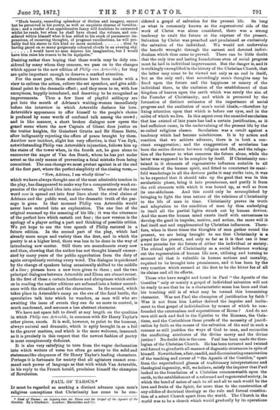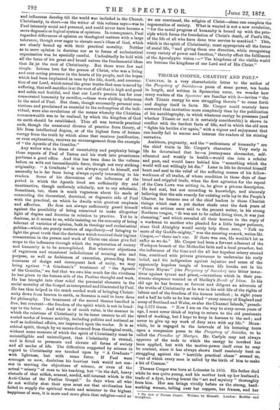PAUL OF TARSUS.*
IT must be regarded as marking a distinct advance upon men's religious conceptions that Christianity has come to be con- * Paul of Tarsus: an hupstry into Me Times and Me (Sopa of Me Apostle of the Gentiles. By a Graduate. London: Macmillan and Co.
sidered a gospel of salvation for the present life. So long as what is commonly known as the supernatural side of the work of Christ was alone considered, there was a strong tendency to exalt the future at the expense of the present. Salvation by Christ was preached and proclaimed as exclusively the salvation of the individual. We would not undervalue the benefit wrought through the earnest and devoted indivi- dualism which thus came to prevail. There can be little doubt that the only true and lasting foundations even of social progress must be laid in individual improvement. But the danger is, and it is strikingly exemplified in the history of the Christian Church, that. the latter may come to be viewed not only as an end in itself, but as the only end ; that accordingly men's thoughts may be fixed upon the future and the happiness or misery of the individual there, to the exclusion of the establishment of that kingdom of heaven upon the earth which was surely the aim of the Founder of Christianity, and which is promoted by the formation of distinct estimates of the importance of social progress and the exaltation of men's social ideals,—therefore by fixing attention upon that which is before our eyes, and in the midst of which we live. In this aspect even the onesided secularism that has existed of late years has had a certain justification, as it had sufficient cause, in the undervaluing of the present life by the so-called religious classes. Secularism was a revolt against a tendency which had become mischievous. It is by action and reaction that we achieve advance, there is in both a con- stant exaggeration ; and the exaggeration of secularism haa been the entire divorce between religion and life, and the relega- tion of the former to what concerns the future alone, while the latter was supposed to be complete by itself. If Christianity con- tained in it elements of regenerative influence suitable to all conditions of the human spirit, and fitted to counteract its mani- fold wanderings in all the devious paths it may strike into, it was to be expected that it should take up the good that was in this secularistic phase, bring it into prominence, and purify it from the evil elements with which it was bound up, as well as from
its one-sidedness. And this could only be accomplished by bringing to light the true nature of the relations of Christianity to the life of man in time. Christianity proves its truth and adaptation to the condition of man by thus embodying in itself all the partial lights struck out by human devices. And the more the human mind exerts itself with earnestness to develop the good in impulse, motive, and action, the more will it feel itself met and supplemented by Christian influences. There- fore, when in these times the thoughts of men gather round the present, we are being brought to see that Christianity is a gospel for the present, and only so far as it is that can it bear a sure promise for the future of either the individual or society. The ethical spirit of Christianity as a social influence working out the regeneration of human life now, utilising and turning to account all that is valuable in human notions and morality, required to be brought into prominence, and it has been by the very reaction which seemed at the first to be the bitter foe of all its claims and all its efforts.
Those who have sought and found in Paul "the Apostle of the Gentiles" only or mainly a gospel of individual salvation will not be ready to see that he in a characteristic sense has been and that his teaching still is of what may be termed this humanising character. Was not Paul the champion of justification by faith ? Was it not from him Luther derived the impulse and incite- ment to that gospel of individualism by means of which he con- founded the externalism and superstitions of Rome ? And do not men still seek and find in the Epistles to the Romans, the Gala- tians, and the Corinthians those proofs of the necessity of justifi- cation by faith as the means of the salvation of the soul in such a manner as still justifies the ways of God to man, and reconciles. the conflicting attributes of the divine mercy and the divine justice ? No doubt this is the case. Paul has been made the theo- logian of the Christian Church. He has been tortured and twisted and forced to give forth all manner of dogmatic utterances in spite of himself. Nevertheless, a fair, candid, and discriminating examinatiom of the teaching and career of "the Apostle of the Gentiles," apart from the superinduced glosses of traditionary interpretations and theological ingenuity, will, we believe, satisfy the inquirer that Paul looked to the foundation of a Christian commonwealth upon the earth, to the establishment of a reformed and regenerated society, in which the bond of union of each to all and all to each would be the love and fruits of the Spirit, far more than to the construction of any edifice of doctrinal theology as the rule and formal constitu- tion of a select Church apart from the world. The Church in the world was to be a church which would gradually by its operations
and influences develop till the world was included in the Church. Christianity, in short—as the writer of this volume says—was to Paul intensely social and personal, and could never have become a mere dogmatic or logical system of opinions. In consequence, Paul regarded differences of opinion on theological matters with a large tolerance, though ever eager to elevate men's ideas of God, which are closely bound up with their practical morality. Neither as to mere opinion in doctrine nor as to forms of ecclesiastical organisation was he specially careful. Undoubtedly he held with all the force of his great and broad nature the fundamental ideas that lie at the root of Christianity. But these were few and simple. Intense love for the person of Christ, who was a living and ever-acting presence in the hearts of his people, and the hopes which had been implanted in men by the life, death, and resurrec- tion of our Lord, which reveal the great truths that man is saved by suffering, that self-sacrifice is at the root of all that is high and good and noble and fruitful, and that our Lord's passion has for ever consecrated humanity by sacrifice,—these were abiding influences in the mind of Paul. But these, though necessarily personal con- victions and proclaimed as essential to the redemption of the indi- vidual, were also revelations of the means whereby the Christian commonwealth was to be realised, by which the kingdom of God on earth should be established. Thus all was towards practical ends, though the unnatural divorce of practice from theory, of life from intellectual dogma, or of the highest form of human energy from the truth by which alone that receives justification, or even explanation, receives no encouragement from the example of "the Apostle of the Gentiles."
Any writer who in times of uncertainty and perplexity brings these aspects of Paul of Tarsus and his work into prominence performs a good office. And this has been done in the volume before us with not inconsiderable force, though not very striking originality. "A Graduate" is not always equal to himself, and assuredly he is far from being always equally interesting to his readers. Some of his discussions of the influences of the period in which the Apostle lived are sufficiently dry and unattractive, though uniformly scholarly, not to say scholastic. Sometimes, too, there is much vagueness about his mode of connecting the theoretical, doctrinal, or dogmatic side of Paul with the practical, on which he dwells with greatest emphasis and affection. He does not always sufficiently guard himself against the possibility of being conceived to make altogether light of dogma and doctrine in relation to practice. Yet he is desirous, as it seems to us, while insisting on the necessity of being tolerant of varieties of opinion, both in theology and ecclesiastical politics—which are purely matters of expediency—of bringing to light the great truth that the doctrines which received their highest consecration in the person and work of Christ can alone give full scope to the influences through which the regeneration of society and humanity is to be accomplished. But whatever objections of vagueness and occasional indefinitenss of seeming aim and purpose, as well as feebleness of execution, proceeding from 'looseness of design and consequent lack of unity, we may bring against "A Graduate's" treatment of the Apostle of the Gentiles," we feel that we owe him much for the vividness be has given to the human side of the Pauline thought and work. He has brought into clear relief the perennial elements in the social morality of the Gospel as interpreted and illustrated by Paul. He has thus helped in the much needed work of bringing Christi- anity down from heaven to earth, as Socrates is said to have done for philosophy. The treatment of the sacred themes handled is tree, but reverent—the freedom of the spirit which is not in bond- age to the letter. And what is of much value, is the manner in which the relations of Christianity in its inner essence to all the waned modes of human activity, including politics and national as well as individual affairs, are impressed upon the reader. It is as ethical spirit, though by no means divorced from theological truth, without some measure of which the spirit of Christianity must be unintelligible and unintelligent, that Christianity is eternal, and is fitted to permeate and elevate all forms of society and all modes of life. The difficulties suggested by science in regard to Christianity are touched upon by "A Graduate" with lightness, but with some force. If Paul were amongst us now, doubtless his heaviest task would not con- sist in meeting the objections of science, or even of the actual " misery " of man to his teaching, but "in the dull, heavy obstacle of that selfish, sensual, sordid, self-interest which is the Anti-Christ of the Pauline Gospel." In days when all who do not wilfully shut their eyes must see that civilisation has failed to supply the spiritual wants and minister to the highest happiness of man, it is more and more plain that religion—and as we are convinced, the religion of Christ—alone can complete the regeneration of society. What is wanted is not a new revelation, "for the moral progress of humanity is bound up with the prin- ciple which forms the foundation of Christ's death, of Paul's life, of the life of all who have done true service to mankind." This, which is the spirit of Christianity, must appropriate all the forces of social life, "and giving them one direction, while recognising every variety of power and function," thereby effect the fulfilment of the Apocalyptic vision :—" The kingdoms of the visible world are become the kingdoms of our Lord and of His Christ."



































 Previous page
Previous page